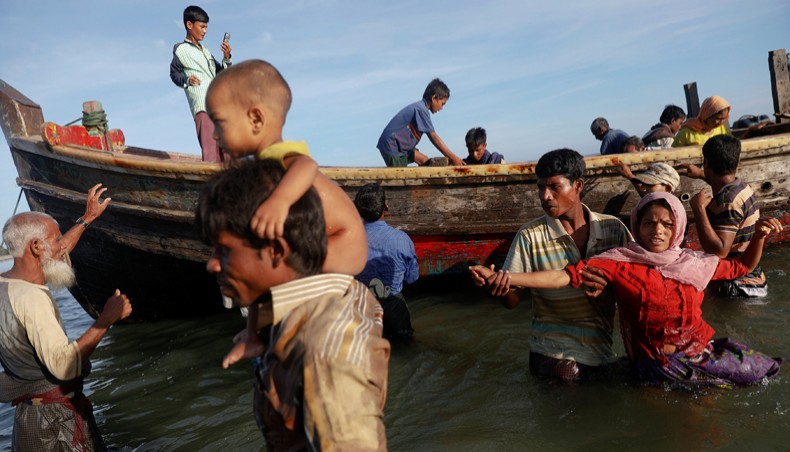Rohingyas pose risk of human trafficking
Many of Rohingyas entering Bangladesh to flee violence in Myanmar are desperate to leave Cox’s Bazar while the police have foiled some of their attempts to cross the border to India and Malaysia.
The government is worried about such attempts and has started to gather all the fleeing ethnic minority Myanmar nationals to a mega camp at Ukhia upazila in Cox’s Bazar and introduced mandatory registration for them to prevent possible trafficking of Rohingyas and for their repatriation, senior officials said.
They said that about 67,000 Rohingyas got registered until October 5.
Police officials said many of the Rohingyas who entered Bangladesh fleeing violence in Myanmar over the years were desperate to find their fortunes.
Armed Police Battalion at Hazrat Shahjalal International Airport detained Hamida Begum, 19, of Borogojo Bill in Maungdaw of Myanmar with two passports — a Bangladesh Machine Readable Passport and a Myanmar passport.
A case was filed with the Airport police station on the issue accusing Al Hafiz Abdur Rahim, Furkan and Joynal of Cox’s Bazar, and Amir Hossain of Chittagong of attempting to traffic the young Rohingya woman.
The police arrested Hafiz and Amir in the airport area and came to know that they were about to traffic Hamida to Malaysia. The police also seized air tickets and visas for Malaysia.
Senior assistant superintendent of police of the battalion Takir Ahmed Al Sadik, who briefly interrogated the Rohingya girl, said that she entered Bangladesh in the past year and paid Tk 40,000 to Furkan and Joynal and promised to pay Tk 1,35,000 more after reaching Malaysia.
Tarik said Hamida managed her passport from Department of Immigration and Passport office at Uttara in Dhaka showing a false permanent address in Jessore.
On September 29, police detained 25-year-old Rohingya woman Nargis Begum and her son Robi of Nurullah Para in Maungdaw in the border in Comilla. Police officials said that Nargis and her son reached there from Teknaf and tried to cross the border into India. Both of them were sent back to Cox’s Bazar.
On October 3, the Border Guard Bangladesh detained seven Rohingyas –– three male, two women and two minors –– at Kalaroa border in Sathkhira while they were trying to enter India, said border guard nayek subedar Omar Fauk.
Cox’s Bazar police spokesperson Afruzul Haque Tutul said on Friday that some 700 Rohingyas were brought back to Cox’s Bazar from places across the country while attempts of 25,000 Rohingyas to flee from Cox’s Bazar had been foiled by law enforcers since September.
Rights activist Nur Khan Liton said that criminal groups would find ways to exploit the desperation of Rohingyas facing uncertain future.
He said that Rohingyas would naturally try to either stay in Bangladesh or move to other countries. ‘And human traffickers will take the opportunity.’
Inspector general of police AKM Shahidul Hoque, who visited the Cox’s Bazar couple of time since September, said that once the Rohingyas would be spreading out of Cox’s Bazar, they would look for Bangladesh passports.
In 2012 and 2013, Shahparir Dwip was used as a transit to reach large fishing trawlers to travel to Malaysia through Thailand. Thailand cracked down on the human traffickers in recent years amid the international outcry while Bangladesh investigators found Rohingyas in Malaysia in nexus with others used to run the trafficking ring.
Alleged human trafficker Mohammad Alam of Shahparir Dwip said that those who were involved in human trafficking in the past would not use sea route for human trafficking now as they suffered a lot.
He said they faced prosecution and could not stay at their houses for 4-5 years.
Border guard director general Major General Abul Hossain in Tekhnaf said that they increased vigilance along the border so that none could go out of the country while especial monitoring of the sea route was ordered.
Acquiring passports for Rohingyas is problematic and they must use fraudulent means with the assistance of syndicates, to do so, the officials said.
Officials in Cox’s Bazar said that at least 250 suspicious passport applications had been rejected since January mostly for using forged national identification cards and other required documents.
One of such applications was filed by a Rohingya woman introducing herself as Hafsa Begum on April 4 forging all necessary documents including the copy of national identification card.
Sanjida Begum, also a Rohingya woman, had forged all necessary documents and applied for a Bangladesh passport on August 10.
‘We rejected the application when we found the related documents were forged,’ said Cox’s Bazar Passport office assistant director Abu Nayeem Masum.
Bangladesh was downgraded to Tier 2 Watch List by the US Department of State this year because it ‘does not fully meet the minimum standards for the elimination of trafficking’, despite ‘significant efforts’.
Cox’s Bazar special public prosecutor Nurul Islam agreed that those who were masterminding the trade continued to escape trial.
He said the names of at least 100 alleged human traffickers had been dropped from charge sheets submitted to the courts. ‘There is lack of transparency in police activities. Police avoid the identified ones only out of their own interests.’
According to the Cox’s Bazar district court, 437 human trafficking cases were filed in the district since 2012. Only 37 of them were disposed of so far.
News Courtesy: www.newagebd.net











